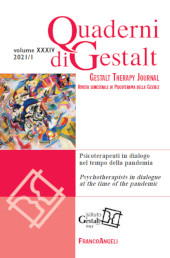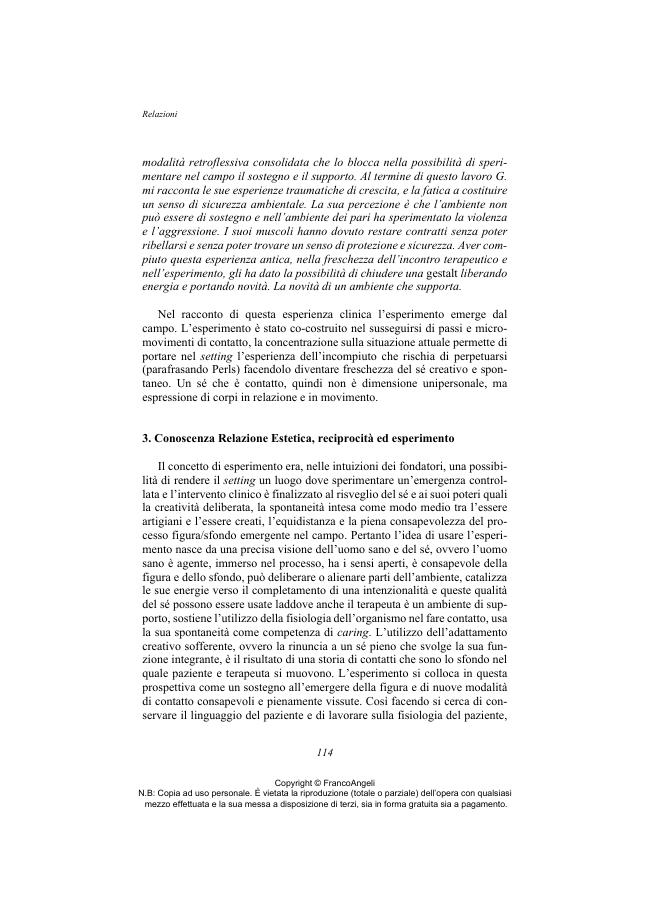Esperimento : estetica e reciprocità nella clinica contemporanea
109-119 p.
L'autore offre una riflessione rispetto all'utilizzo dell'esperimento nella clinica gestaltica. Partendo dagli sviluppi e dagli studi attuali sulla Conoscenza Relazionale Estetica e sulla reciprocità in psicoterapia (Spagnuolo Lobb, 2017a; 2017b; 2020), presenta l'uso dell'esperimento come possibilità del campo fenomenologico, piuttosto che come una tecnica rigida e preordinata. L'attenzione epistemologica è finalizzata a chiarire come il focus terapeutico sia principalmente il contatto e il sé in contatto. L'esperimento può essere un modo per inserire la "novità" nel processo terapeutico utilizzando gli strumenti estetici e fenomenologici della terapia della Gestalt. In particolare, l'autore, vuole definire l'esperimento in un'ottica relazionale e di campo. Si tratta di ricontestualizzare un tema importante dell'epistemologia gestaltica riconducendolo sia alla teoria del sé, che ai bisogni e alle sofferenze che oggi i pazienti portano in terapia. [Testo dell'editore].
This paper offers reflections on the use of experiment in the contemporary Gestalt clinical practice. In the section "Phenomenology and experiment", the author focuses on the phenomenological "turn" in Gestalt therapy in terms of its relational and experimental approach. Building on current developments and studies on Relational Aesthetic Knowledge and reciprocity in psychotherapy (Spagnuolo Lobb, 2017a; 2017b; 2020), she presents the use of experiment as meaningful possibility of the phenomenological field and not as a rigid, technique imposed upon experience. The epistemological and therapeutic focus is aimed at contact and self in contact. Today, experiment can be one of the ways to insert "novelty" in the therapeutic process by using the typical aesthetic and phenomenological tools of Gestalt therapy.
In particular, the author wants to define the experiment in a relational and field perspective so that the experiment's objective is not so much a cathartic experience, but a relational experience at the contactboundary. This involves recontextualizing an important theme of Gestalt epistemology by purging it of a theatrical dimension and bringing it back both to the theory of self and to the needs and suffering that patients bring to therapy today. In particular, the author offers a nontechnical vision of the use of the experiment based on the creativity and originality that each therapist tries to put into their work. From the theoretical point of view, the author focuses on both the phenomenological and the aesthetic aspects that are used to propose an experiment. Finally, she offers some guidelines for therapists to orient themselves in their in experimental work.
The article is also intended for therapists in training in order to help them understand the epistemological framework of the way of intervening in Gestalt therapy and the fine line between therapeutic and technical art. [Publisher's text].
-
Artículos del mismo número (disponibles individualmente)
-
Información
Código DOI: 10.3280/GEST2021-001012
ISSN: 2035-6994
MATERIAS
KEYWORDS
- Contatto, esperimento, teoria del sé, reciprocità, tecnica
- Contact, experiment, selftheory, reciprocity, technique



